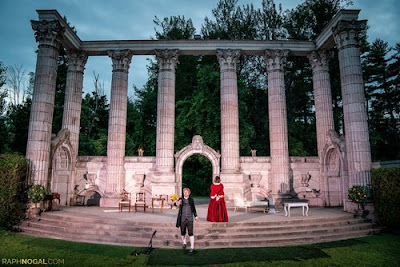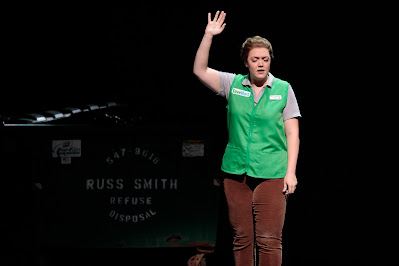Reviewed by James Karas
For the latter part of its season The Stratford Festival has chosen an extremely difficult but phenomenal play that is both timely and overdue. It is Death and the King’s Horseman by Nigerian playwright Wole Soyinka, and it receives exemplary treatment at the Tom Paterson Theatre.
Death and the King’s Horseman is a complex, poetic play based on a true story. The king of the Yoruba tribe, Nigeria, dies and his horseman, a high ranking official, must commit suicide in order to help his former employer in the next world. This is an entrenched, venerable, highly honourable and honoured tradition that brooks no argument. It is part of the lifeblood of the Yoruba people.
Soyinka has dramatized the incident that occurred in the 1940s, transposed it to the time of World War II and put his stamp on it. Elesin, the Horseman to the King, is preparing to die but goes to the boisterous marketplace for the last time. The Praise Singer questions the Horseman who plans to end his life but also wants to enjoy his last night on earth with a woman that is not his wife.
The Yoruba patois of which most of the audience was unaware was difficult to decipher. At first, I thought of this as unacceptable, but the program informs us that the production has a Yoruba Dialect Coach (Wole Oguntokun). The meaning of the exchanges was fairly clear even if the words were not all understood and Soyinka and director Tawiah M’Carthy clearly intended us to hear the text in its authentic cadences.
In the early 1940s, the time of the play, Yoruba a was a British colony and Simon Pilkings (Graham Abbey) was the District Officer. He is a classic example of an imperial overlord. arrogant, bigoted to the point of being unable to consider the natives as people let alone appreciate their culture. He and his wife wear a native costume that is offensive, but they refuse to remove it because they want to win a prize at a costume ball. But he will not permit Elesin to die because he considers it barbaric.
The District Officer has Elesin arrested and with an obtuseness that will not allow any argument he does not permit Elesin to fulfil his pr-ordained and honourable duty, his death, an act that has significance far deeper that the Englishman can even begin to understand.
I will not disclose the tragic end of the play in the belief that most people may not know it.
The performances elicited by director M’Carthy are models of superb acting in exceedingly difficult roles. Anthony Santiago as Elesin, the King’s Horseman recites the sometimes tortuously difficult poetry and can project the man of honour, the man who wants to enjoy his last hours on earth and the tortured being who may be denied his ultimate duty as a human being. His performance is superb for the depths of feeling that he displays and the many challenges that he faces.
Amaka Umeh is the lithe Praise Singer who displays vocal and physical agility giving a simply outstanding performance Akosua Amo-Adem plays Iyaloja, Mother of the Market. She is the leader of the seven women who react to Elesin’s poetic recitation and are involved in the rest of the play. One cannot praise her enough for the forcefulness of her acting, her humanity and utterly memorable performance.
Graham Abbey gives a superior performance as the District Officer as does Maev Beaty as his wife Jane, who is a more sympathetic person towards the natives than him.
Rachel Forbes’ set shows the marketplace in the first scene and then switches to a balcony for the finely attired colonial masters including the visiting English Prince. They are having a costume ball and are almost impervious to the actions of the natives, including possibly a riot. The final scene takes place in a holding cell where Elesin is held to prevent him from fulfilling his life’s work.
This is theatre at its best and is worth seeing more than once. I hope the production will be videotaped for watching again in the near future.
______________
Death and the King’s Horseman by Wole Soyinka opened on August 27, 2022, and will run until October 29, 2022, at the Tom Patterson Theatre as part of the Stratford Festival in Stratford, Ontario. www.stratfordfestival.ca
James Karas is the Senior Editor - Cultre of The Greek Press










